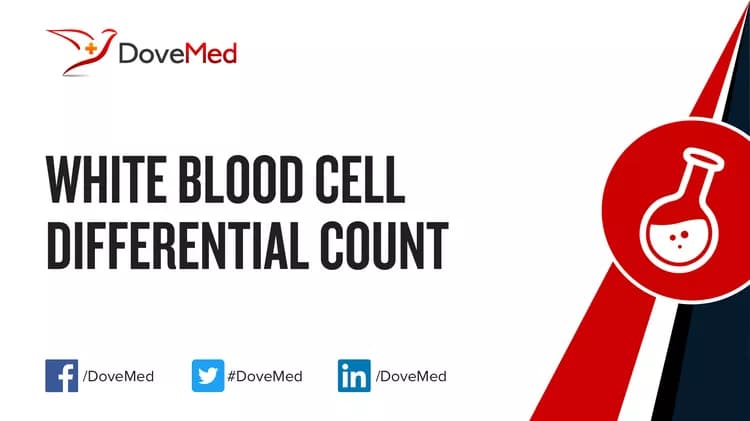What are the other Names for this Test? (Equivalent Terms)
- DC (Differential Count)
- Peripheral Differential
- WBC Differential Count
What is White Blood Cell Differential Count? (Background Information)
- White blood cells (WBCs) serve as the body’s “defenders”. They play an important role in immune responses and help fight against infections. They are also involved in inflammatory responses, allergies, and protect against cancer development
- WBC types include neutrophils, eosinophils, basophils, lymphocytes and monocytes, and macrophages
- Neutrophils, eosinophils, and basophils, are classified as granulocytes, based on their granulated appearance under a microscope. These granules contain chemicals that help with the cellular function.
- Neutrophils help fight against infections (mainly acute bacterial)
- Eosinophils help fight against parasitic infections
- Both eosinophils and basophils, play a role in allergic responses
- Lymphocytes include further subtypes:
- B cells, which produce antibodies (proteins that help in mediating immune responses)
- T cells, which can either help in orchestrating immune responses, or killing the infected cells or tumor cells directly
- NK cells (natural killer cells) that attack the infected cells or tumor cells
- The monocytes usually leave the blood stream and enter tissues, where they become cells, called macrophages. These are huge cells that help in clearing infections and in inflammatory responses (especially in chronic conditions)
- While WBC count indicates an increase or decrease in total white cell numbers, the WBC Differential Count reports the proportion of each subtype of WBC, as a percentage of total WBC present. The absolute number of each cell type, can be then calculated from these values
- Knowing the percentage of each type of WBC, provides clues about the ongoing disease process and help in diagnosing or monitoring infections, inflammatory conditions, blood disorders, or allergic responses
- The presence of young/immature forms of WBC (such as band neutrophils) provides additional diagnostic information too
What are the Clinical Indications for performing the White Blood Cell Differential Count?
Indications for performing a White Blood Cell Differential Count include:
- Evaluation of general health condition of an individual. A Differential Count is often ordered along with a complete blood count (CBC) test
- Individuals with signs and symptoms suggestive of infection or inflammation, such as fever, headaches, body pain, and other findings specific to the underlying condition
- Individuals with signs/symptoms suggestive of blood disorders, such as recurrent infections, bleeding, pallor, etc.
- To monitor individuals with conditions known to affect WBC levels
- To monitor individuals on treatments, such as chemotherapy, radiation, or on drugs known to affect WBC Counts
- As a follow up to an abnormal total white count
How is the Specimen Collected for White Blood Cell Differential Count?
Sample required: Blood
Process:
- Blood sample is drawn through a needle inserted into the vein (arm), or obtained through a finger prick
- In newborns: Blood sample is drawn from the heel after making a small nick using a scalpel. This is called heel stick
Preparation required: None
What is the Significance of the White Blood Cell Differential Count Result?
The normal White Blood Cell Differential Count, called the reference range, may vary slightly from lab to lab. Hence, most lab reports come with a reference range, which is used in that particular centre. A physician interprets the results based on the reference values provided.
A standard reference range in wide use is:
- Neutrophils: 40% to 60%
- Band (young neutrophil): 0% to 3%
- Eosinophils: 1% to 4%
- Basophils: 0.5% to 1%
- Lymphocytes: 20% to 40%
- Monocytes: 2% to 8%
Some conditions that may increase neutrophils (neutrophilia) include:
- Acute Infections (mainly bacterial)
- Inflammatory disorders, such as inflammatory bowel disease, rheumatoid arthritis, etc.
- Myelocytic leukemia (a type of blood cancer)
- Acute stress
- Tissue damage as a result of trauma, burns, or in conditions, such as a heart attack
Some conditions that may decrease neutrophils (neutropenia) include:
- Bone marrow suppression due to drugs, chemotherapy, radiation, or infection
- Cancer that has spread to the bone marrow
- Severe infections (sepsis)
- Aplastic anemia - a disease in which all blood cell types are reduced
Some conditions that may increase eosinophils (eosinophilia) include:
- Allergies
- Parasitic infections
- Some types of cancer
Some conditions that may increase basophils (basophilia) include:
- Allergies
- Some cancers and inflammatory disorders
Some conditions that may increase lymphocytes (lymphocytosis) include:
- Viral infections
- Long-standing bacterial infections, like tuberculosis
- Blood cancers, such as leukemia, lymphoma
Some conditions that may decrease lymphocytes (lymphocytopenia) include:
- HIV
- Chemotherapy, radiation, and other causes of bone marrow damage
- Cancers that have spread to the bone marrow
- Some autoimmune disorders, like lupus
Some conditions that may increase monocytes (monocytosis) include:
- Long standing infections, such as tuberculosis, fungal infections, etc.
- Chronic inflammatory disorders, such as inflammatory bowel disease, autoimmune conditions like collagen vascular disorders, etc.
- Infectious mononucleosis
- Some forms of leukemia
Some conditions that may decrease monocytes (monocytopenia) include:
- Monocyte counts are persistently reduced in a cancer, called hairy cell leukemia, and in bone marrow damage/failure
The laboratory test results are NOT to be interpreted as results of a "stand-alone" test. The test results have to be interpreted after correlating with suitable clinical findings and additional supplemental tests/information. Your healthcare providers will explain the meaning of your tests results, based on the overall clinical scenario.
Additional and Relevant Useful Information:
Certain medications that you may be currently taking may influence the outcome of the test. Hence, it is important to inform your healthcare provider, the complete list of medications (including any herbal supplements) you are currently taking. This will help the healthcare provider interpret your test results more accurately and avoid unnecessary chances of a misdiagnosis.
Related Articles
Test Your Knowledge
Asked by users
Related Centers
Related Specialties
Related Physicians
Related Procedures
Related Resources
Join DoveHubs
and connect with fellow professionals


0 Comments
Please log in to post a comment.